Singing, bubble blowing, chalk drawing, and many more activities were enjoyed along a temporary car-free Havenwood Drive as part of the City of Mississauga’s School Streets pilot project. To celebrate the initiative, students, elected officials, and community members gathered in the street to play, as well as for walking and wheeling.
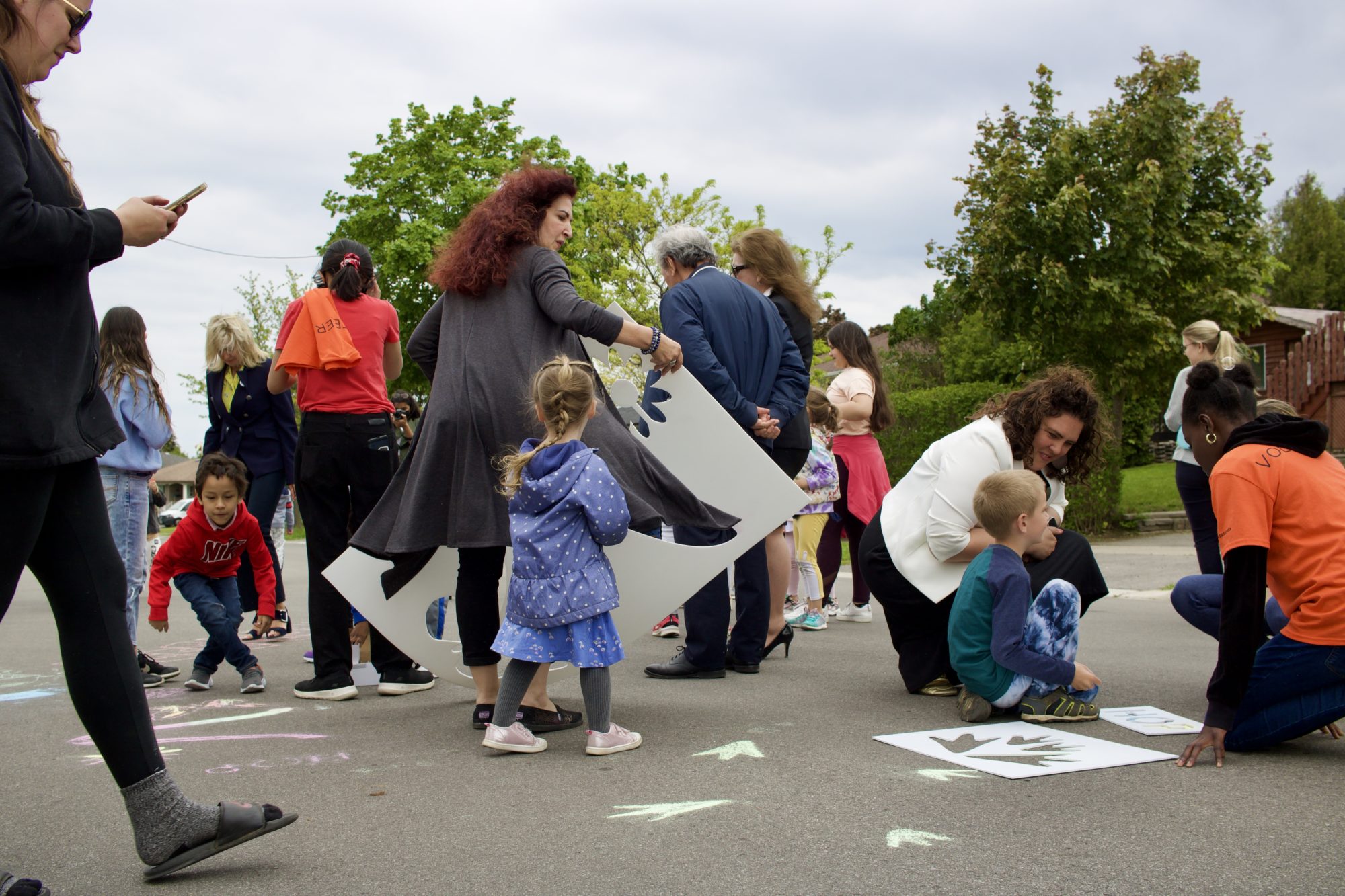
Students, elected officials, and community members gathered in the open street (photo by: Green Communities Canada).
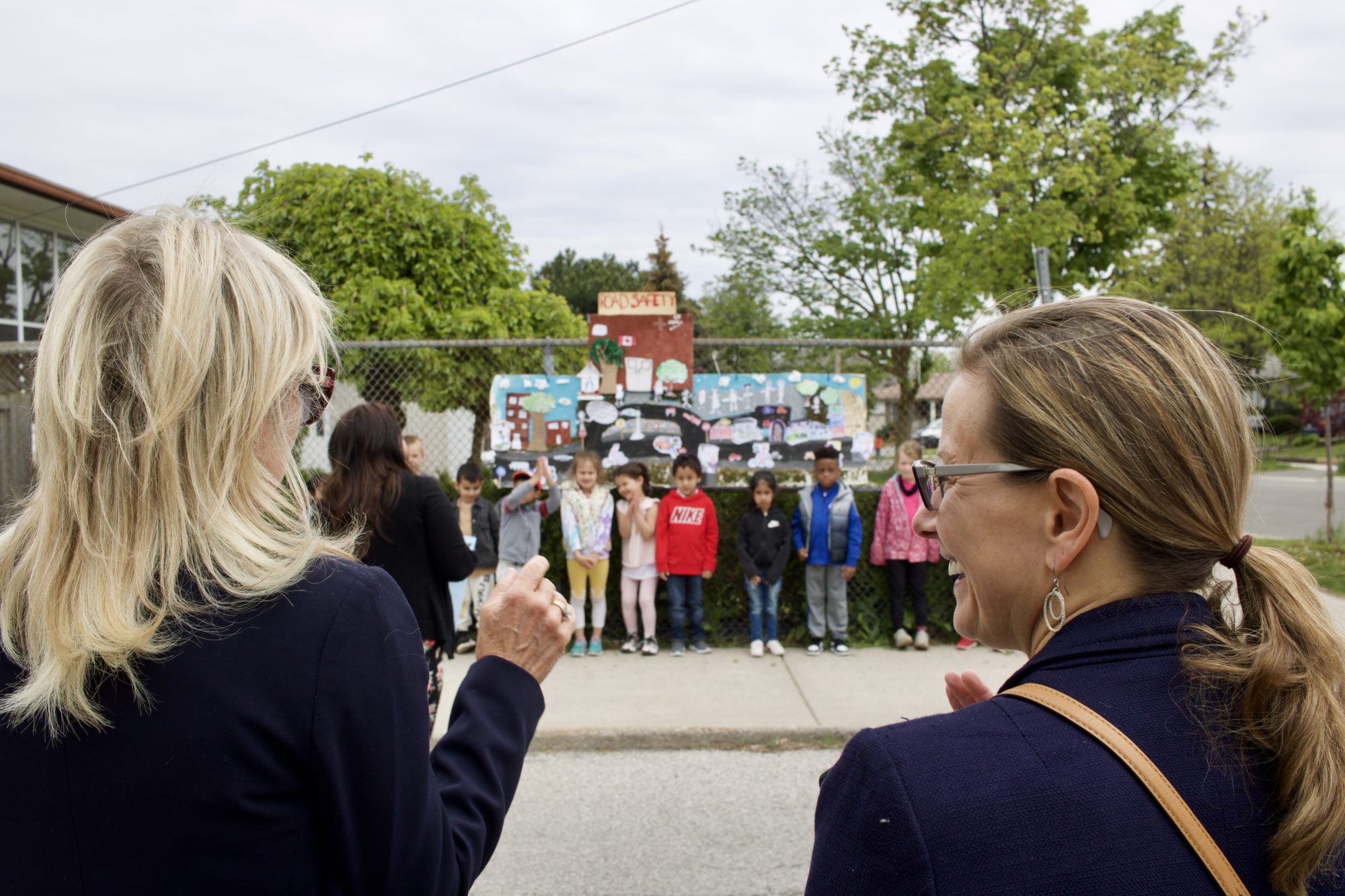
Elected officials, Mississauga Mayor Bonnie Crombie and Councillor Chris Fonseca (Ward 3), enjoying a road safety song by students at St. Alfred School (photo by: Green Communities Canada).
The Mississauga School Streets initiative includes two School Streets locations, involving three elementary schools – one at Hillside Public School and the other at St. Alfred Separate School and Brian W. Fleming Public School.
“Vehicle congestion in our school zones does not need to be the norm – School Streets has shown us there is a safer, greener way. Choosing to leave the car at home and use an active form of transportation instead, whether it’s walking or rolling by bike, scooter or mobility device, helps you stay healthy, creates safer streets and is good for the environment. I want to thank the staff, students and parents at Hillside Public School, St. Alfred Separate School and Brian W. Fleming Public School for their participation, as well as the local community members for their support.” – Mississauga Mayor Bonnie Crombie
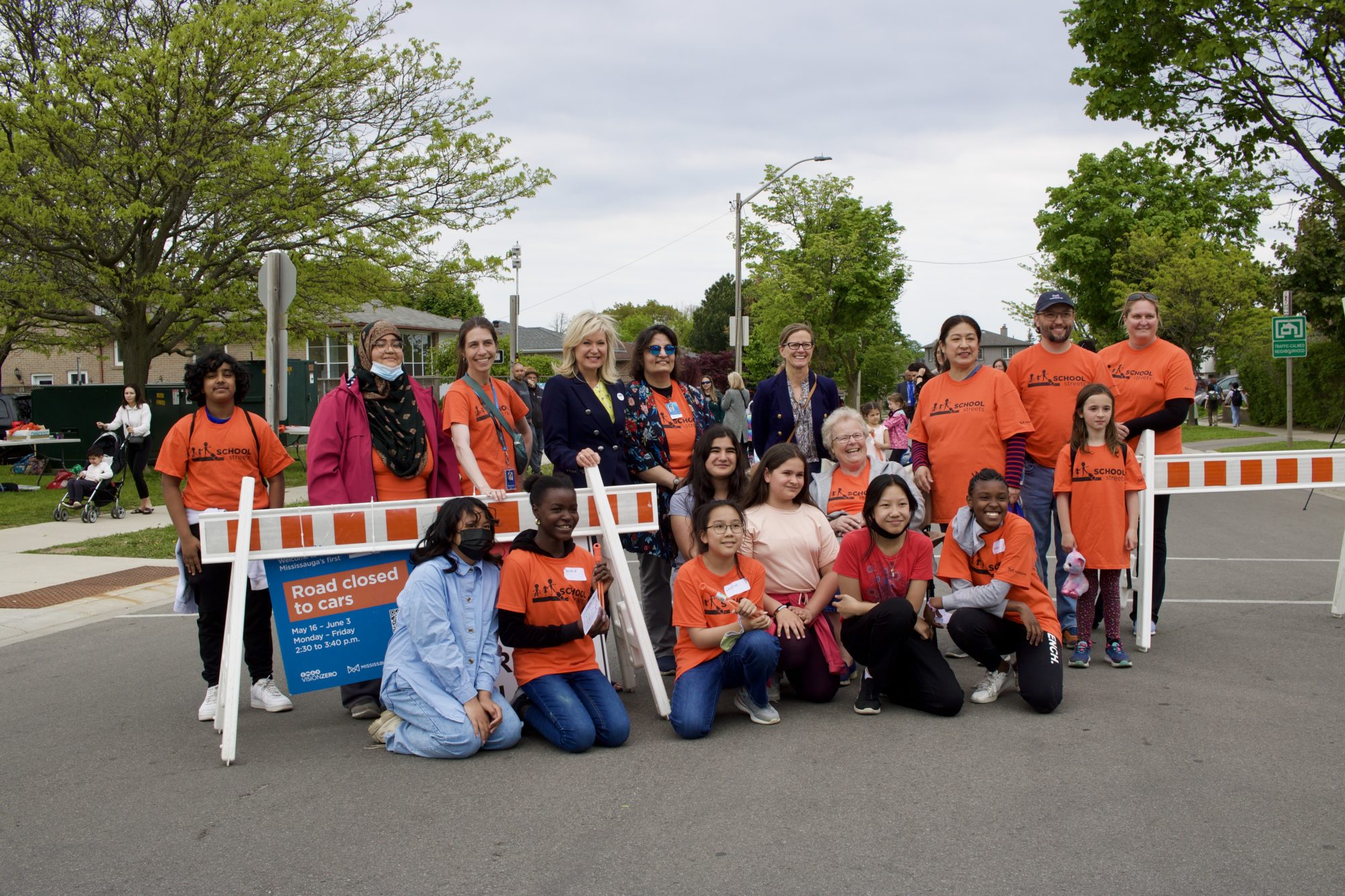
A group of elected officials, city staff, and project volunteers beside the street barriers (photo by: Green Communities Canada)
Planning and Logistics
The initiative uses temporary barriers at either end of the street and restricts access to the school’s parking lots, encouraging students to walk, bike or wheel to increase street safety.
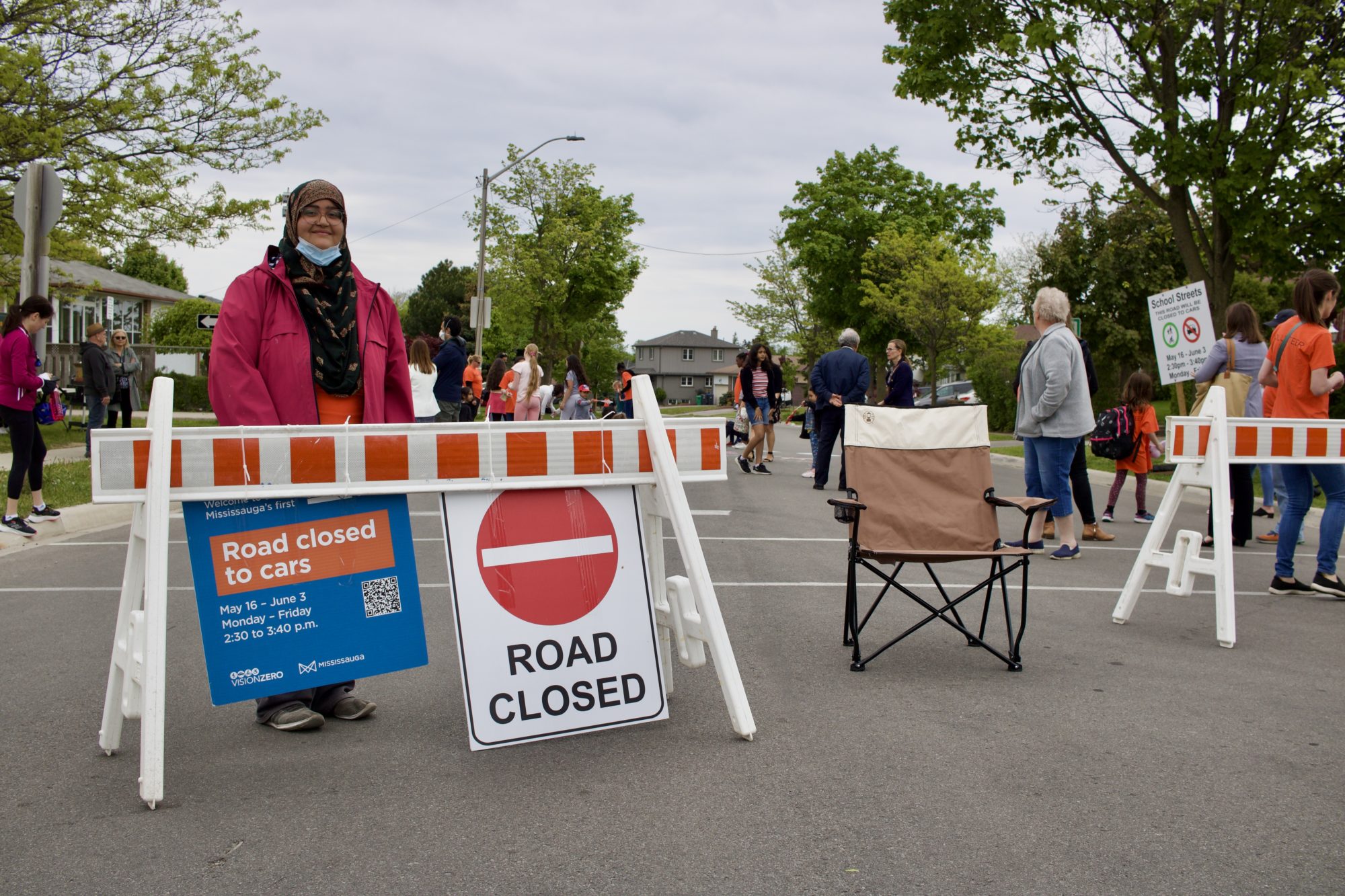
Road closure barriers placed at Tyneburn Crescent on Havenwood Drive (photo by: Green Communities Canada).
“As part of the pilot, we conducted extensive public consultation with community members that attend and/or live nearby the selected schools. This process of distributing surveys, conducting focus groups, and holding information sessions led to broad public support for the initiative and a pilot that truly reflected the needs of the community,” said Laura Zeglen, Active Transportation Coordinator at the City of Mississauga and School Streets project lead. “Doing public consultation well, with an equity-based approach, takes a lot of time and resources, but it is vitally important to the success of projects in shared public spaces.”
The Hillside School Street runs from May 9 – 27, creating temporary road closures for the week-day morning drop-off (8:15 – 8:50 am) and afternoon pick-up (2:30 – 3:20 pm).
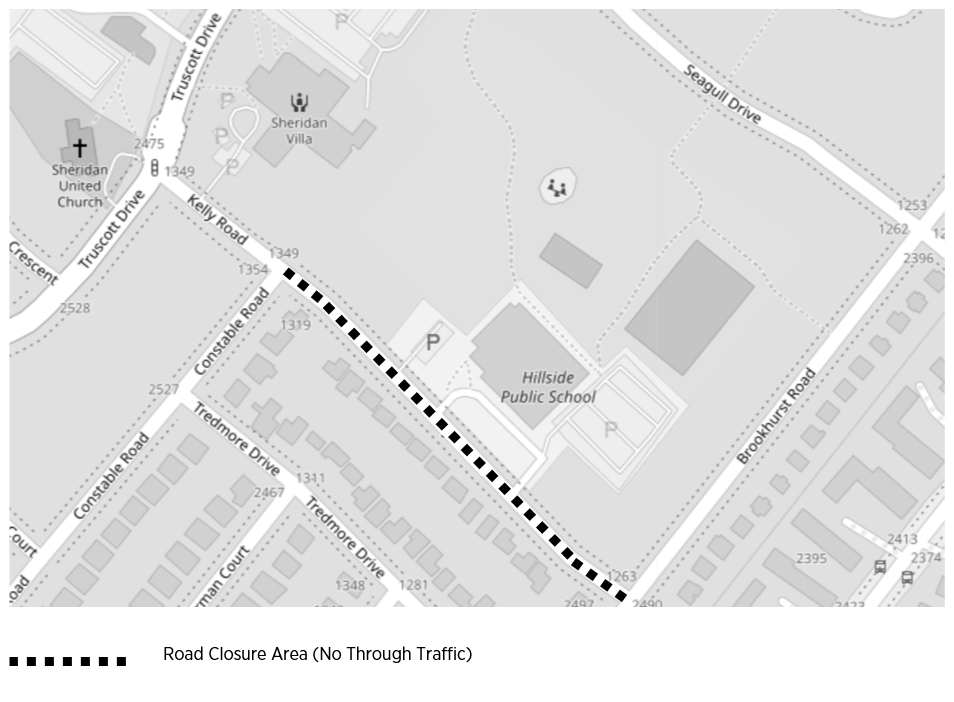
The first School Street at Hillside Public School is located along Kelly Road, between Constable Road and Brookhurst Road (photo: City of Mississauga)

Road closure barriers placed at Tyneburn Crescent on Havenwood Drive (photo by: Green Communities Canada).
The St. Alfred Separate and Brian W. Fleming School Street runs from May 16 – June 3, closing streets for the afternoon pick-up (2:30 – 3:20 pm).
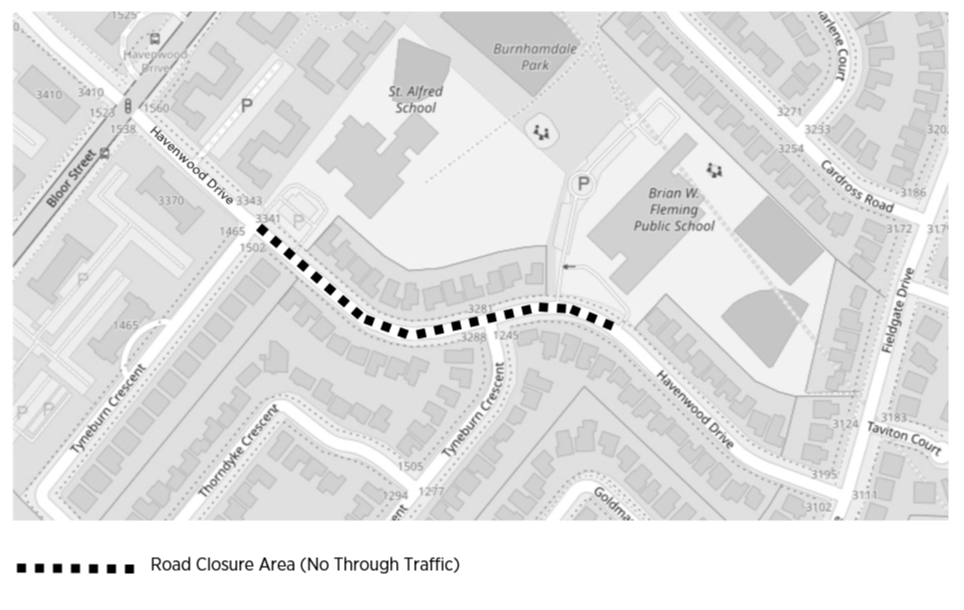
The second School Street at St. Alfred Separate School and Brian W. Fleming Public School is located along Havenwood Drive (photo: City of Mississauga)
The pilot is led by the City of Mississauga and is part of an approved action within the city’s Vision Zero Action Plan, which is working towards the goal of zero fatal and serious collisions on the road network. Action 90 states to “develop a pilot program to create a car-free environment in front of Mississauga schools during drop-off and pick-up times to encourage active travel to school and improve safety for students by reducing congestion and conflicts.”
To evaluate the pilot’s success, the team has collected baseline data of vehicles and active transportation users in the area using tube-counters and traffic observations. The team has also conducted classroom surveys to gain insight from the students about their perceptions of safety and active school travel.
Animating the Car-free Space
The project team has coordinated programming with a specific theme each week, such as road safety, health & wellness, and the environment, helping to further activate the streets.
“The City of Mississauga has done a fantastic job in making the School Streets inviting to students. They have coordinated with educators and other community partners to lead programming like bike rodeos, group exercise, and outdoor experiential learning,” remarked Kate Berry, Program Director at Green Communities Canada. “This makes such a difference in how students and families interact with the street – they feel comfortable playing, socializing, and practicing their wheeling skills. This highlights the significant need for more kid-friendly spaces in our communities.”
Students and their families enjoying the car-free street space in a variety of ways:

Students using chalk to create art in the car-free street (photo by: Green Communities Canada)
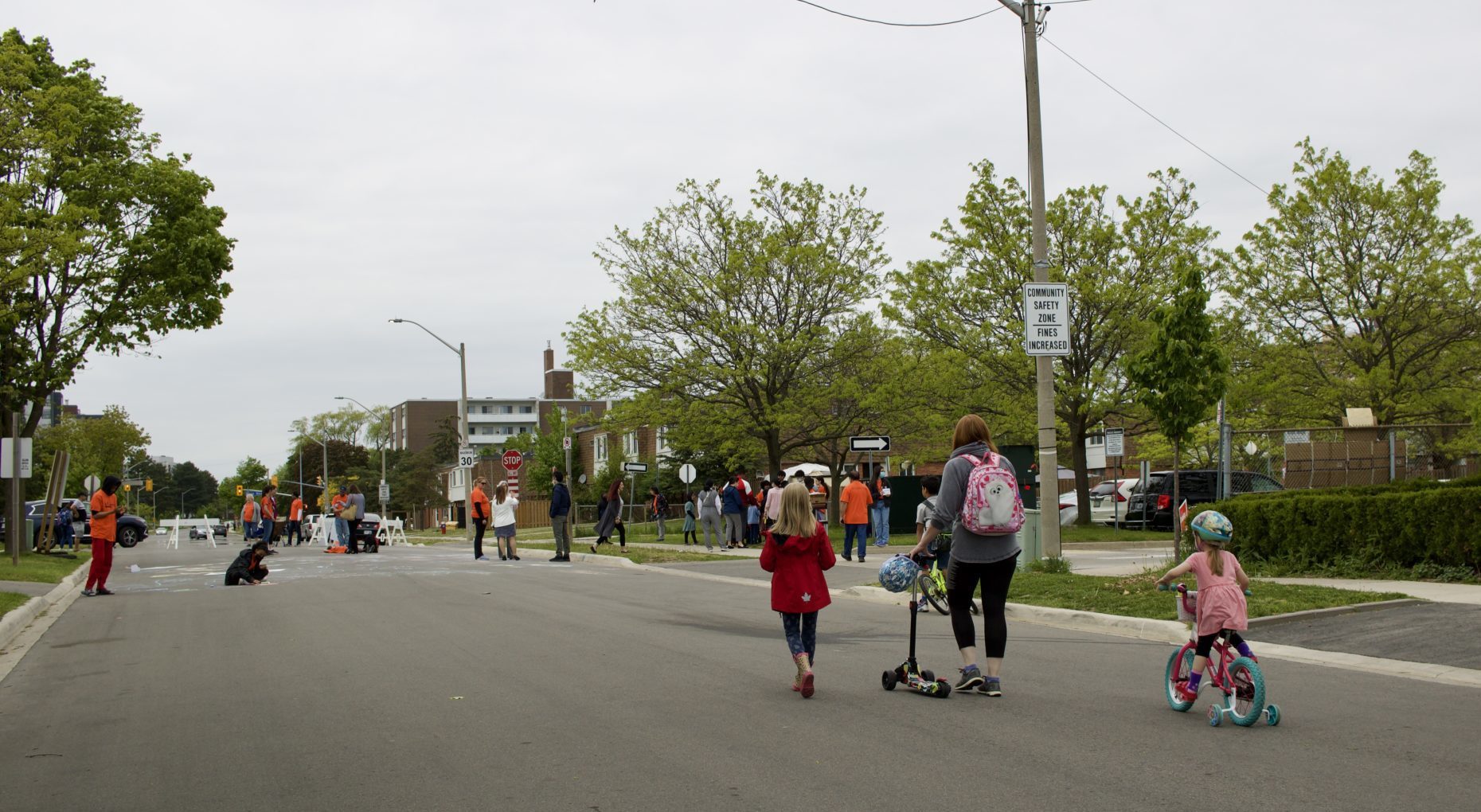
A family walking and wheeling home from school using the School Street (photo by: Green Communities Canada).
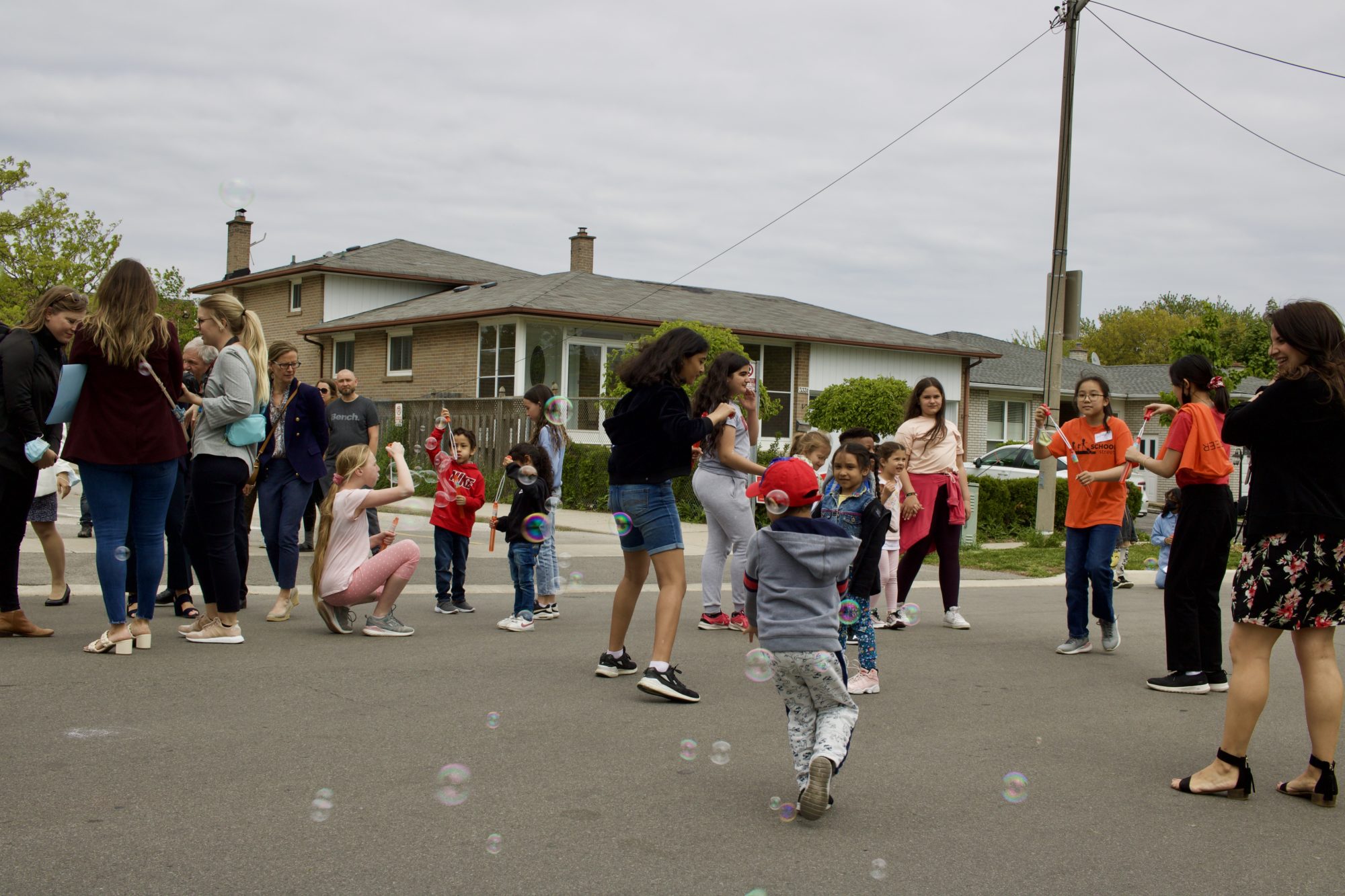
Students, elected officials, and community members gathered in the open street (photo by: Green Communities Canada).
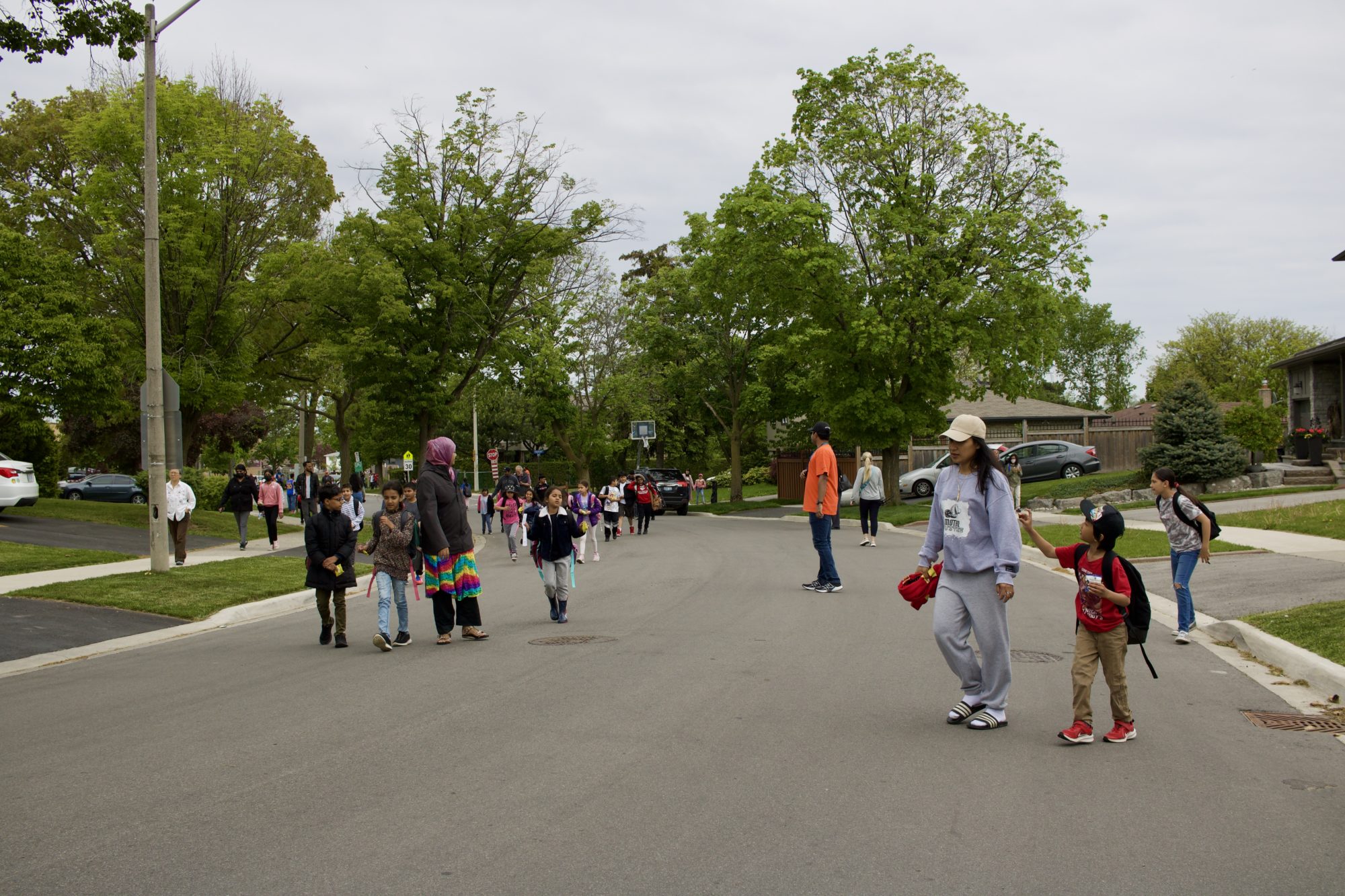
Families walking home from school using the School Street (photo by: Green Communities Canada).
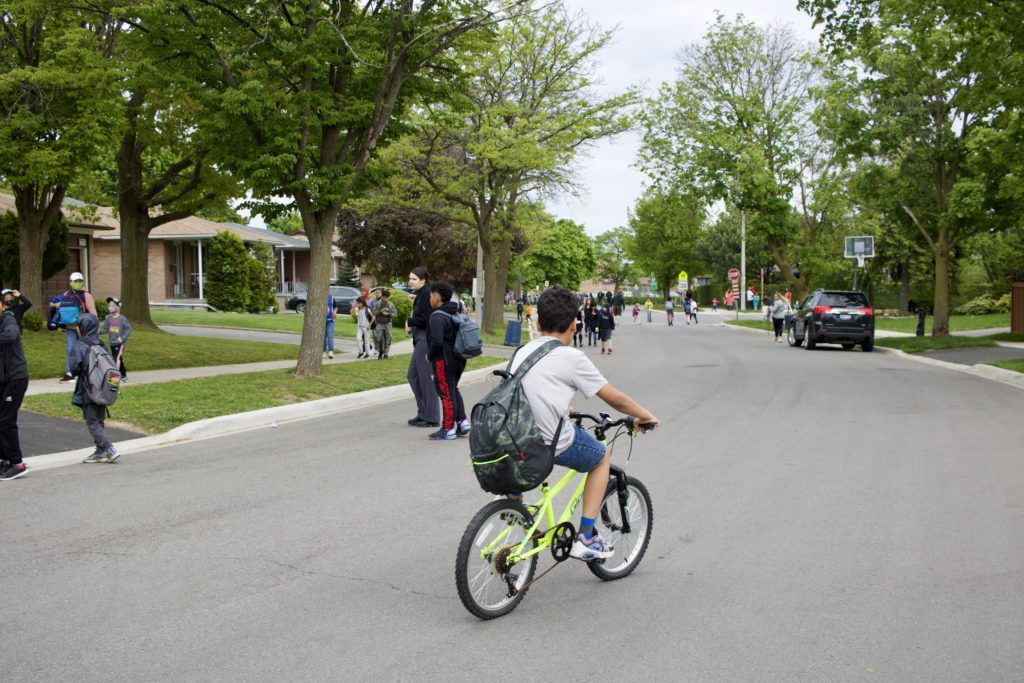
A student biking home from school using the School Street (photo by: Green Communities Canada).

Students gathered in the open street doing chalk street art (photo by: Green Communities Canada).
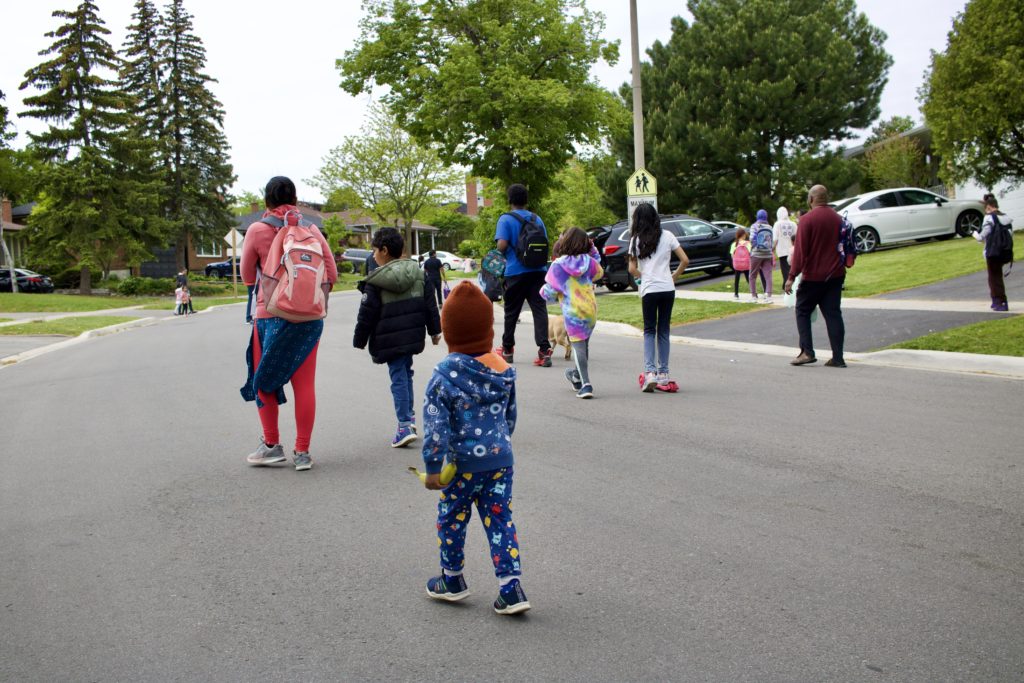
Families walking home from school using the School Street (photo by: Green Communities Canada).

Students playing with bubbles in the open street (photo by: Green Communities Canada).
To hear more about what the students and school staff thought of their School Street, check out these video testimonials captured by the City of Mississauga.
Provincial Collaboration
The Mississauga pilot is the second of three projects happening this spring as part of the Ontario School Streets Pilot (OSSP). Led by Green Communities Canada (GCC) and 8 80 Cities, the OSSP project is testing the implementation of car-free zones at schools in Markham, Mississauga, and Hamilton.
“The City of Mississauga had ambitious plans to do School Streets at two locations for a duration of three weeks each. They set high standards for this pilot, and with months of hard work, they have, without a doubt, delivered on it!” said Jiya Benni, Project Manager at 8 80 Cities. “The extensive public consultation, data-collection, and programming in Mississauga have provided really valuable insights to share with project partners in Markham and Hamilton, making the collective OSSP stronger.”
Congratulations to the City of Mississauga on their successful School Streets pilot and celebration event!
To stay in the loop about the Ontario School Streets Pilot project as it rolls out, we encourage you to follow @OntarioAST, @GCCCanada, and @8 80 Cities on Twitter and sign up for the OAST News newsletter.
The Ontario School Streets Pilot project is funded through the Ontario Active School Travel Fund, which is made possible through financial support from the Government of Ontario.

Trackbacks/Pingbacks